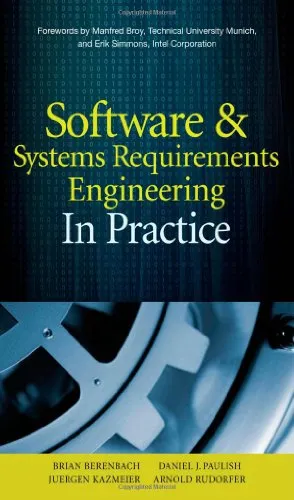Software & Systems Requirements Engineering: In Practice
4.5
بر اساس نظر کاربران

شما میتونید سوالاتتون در باره کتاب رو از هوش مصنوعیش بعد از ورود بپرسید
هر دانلود یا پرسش از هوش مصنوعی 2 امتیاز لازم دارد، برای بدست آوردن امتیاز رایگان، به صفحه ی راهنمای امتیازات سر بزنید و یک سری کار ارزشمند انجام بدینکتاب های مرتبط:
معرفی کتاب "Software & Systems Requirements Engineering: In Practice"
کتاب "Software & Systems Requirements Engineering: In Practice" یکی از جامعترین و کاربردیترین منابع در حوزه تجزیه و تحلیل و مهندسی نیازمندیها برای نرمافزار و سیستمهای پیچیده است. این اثر توسط نویسندگان برجسته یعنی "Brian Berenbach"، "Daniel Paulish"، "Juergen Kazmeier" و "Arnold Rudorfer" نوشته شده و به چالشهای عملی و مفاهیم نظری این حوزه به شکلی فراگیر میپردازد.
خلاصهای از کتاب
این کتاب در چندین بخش به تفصیل به موضوع مهندسی نیازمندیها (Requirements Engineering) پرداخته و فضایی عملی و مبتنی بر نیازهای دنیای واقعی برای خوانندگان ایجاد میکند. با شروع از مباحث پایهای درباره اصول و مفاهیم کلی در زمینه Requirements، نویسندگان با ارائه مثالهای کاربردی و توضیحات دقیق، خوانندگان را در مسیر بهبود درکی عمیقتر یاری میکنند.
مباحثی همچون تعریف نیازمندیها، مستندسازی، تحلیل ذینفعان (Stakeholders)، ابزارهای مختلف، و تعاملات تیمی برای درک بهتر نتایج پروژهها بهطور گسترده در این کتاب پوشش داده شده است. استفاده از مطالعات موردی (Case Studies) نیز کمک میکند تا مفاهیم بهصورت عینی و عملي در ذهن مخاطب شبیهسازی شوند.
نویسندگان همچنین به روشهای بهینه برای مواجهه با مسائل پیچیده و احتمالاً مبهم میپردازند و خوانندگان را تشویق میکنند تا از ابزارهای مدرن و رویکردهای سیستماتیک در پروژههای خود بهره ببرند.
نکات کلیدی کتاب
- اهمیت فهم درست نیازمندیهای کاربران و ذینفعان و تاثیر آن بر موفقیت پروژه.
- نقش مدلسازی و ابزارهای مدرن در تحلیل و مستندسازی نیازمندیها.
- پایبندی به رویکرد سیستمی برای شناسایی وابستگیها و مخاطرات موجود در پروژهها.
- تعامل مستمر با Stakeholders برای جلوگیری از مشکلات اجرایی در مراحل بعدی.
- ارائه تکنیکهای عملیاتی برای تجزیه و تحلیل و مستندسازی دقیق.
نقلقولهای معروف از کتاب
"The success of any software or complex system project hinges on understanding and correctly documenting the requirements."
"Requirements engineering is not just a phase; it is an ongoing process that continues throughout the lifecycle of a project."
اهمیت این کتاب
با توجه به این که مهندسی نیازمندیها یکی از مهمترین مراحل چرخه حیات توسعه نرمافزار و سیستمها است، تسلط بر این علم برای موفقیت پروژههای بزرگ و کوچک ضروری است. کتاب "Software & Systems Requirements Engineering: In Practice" با پرداختن به چالشها و مسائل واقعی در پروژهها، ابزارها و تکنیکهایی موثر و کاربردی را پیشنهاد میدهد که به پیشبرد بهتر پروژهها کمک میکنند.
این کتاب نه تنها برای مهندسان نرمافزار بلکه برای مدیران پروژه، ذینفعان، تحلیلگران کسبوکار و حتی دانشجویان رشته مهندسی نرمافزار مفید و ارزشمند است. نگاه عملی، ارائه ابزارهای قابلاستفاده و تمرکز بر مشکلات واقعی این اثر را به منبعی بیبدیل در این حوزه تبدیل کرده است.
Introduction
Welcome to Software & Systems Requirements Engineering: In Practice, a comprehensive guide that bridges the gap between theory and the real-world practice of requirements engineering. Authored by Brian Berenbach, Daniel Paulish, Juergen Kazmeier, and Arnold Rudorfer, this book provides invaluable insights, methodologies, and tools for addressing one of the most critical phases in software and systems development: requirements engineering. With decades of expertise combined into a single resource, this book is designed to equip both professionals and students with actionable knowledge for effective project execution. Whether you're a business analyst, a project manager, or a software engineer, this guide aims to ensure your projects benefit from well-defined and structured requirements, positioning them for success.
Detailed Summary of the Book
The book begins by outlining the foundational principles of requirements engineering, underscoring its importance in the software and systems development lifecycle. It emphasizes that inadequate or poorly defined requirements are one of the leading causes of project failures. From there, the authors delve into practical techniques, such as stakeholder analysis, requirements elicitation, modeling, specification, and validation. Each chapter is structured to not only explain the theory but also lay out practical, step-by-step methods supported by real-world examples and industry case studies.
Key topics include managing changing requirements in dynamic environments, the role of tools and technology in modern requirements engineering, and strategies for aligning requirements with organizational goals. The book also addresses complexities unique to distributed teams and large, multidisciplinary projects. By the latter chapters, readers are introduced to advanced methods for requirements validation and verification, ensuring that delivered systems meet stakeholder expectations.
What sets this book apart is its focus on practical application. Rather than overwhelming readers with abstract academic theory, it provides actionable advice and checklists that professionals can directly implement in their projects. Additionally, the authors dedicate sections to common pitfalls, drawing from their vast experiences to illustrate how to avoid costly missteps in requirements engineering.
Key Takeaways
- The critical role of well-defined requirements in project success.
- Leveraging stakeholder analysis techniques to uncover and prioritize needs effectively.
- Step-by-step methods for requirements elicitation, documentation, and validation.
- How to manage evolving requirements in fast-paced or large-scale environments.
- Practical insights into aligning requirements engineering processes with organizational objectives and team dynamics.
- Exploration of modern tools and technologies that support requirements engineering tasks.
Famous Quotes from the Book
"Requirements are not just about writing documents; they are about enabling shared understanding among stakeholders and ensuring that what gets built creates value."
"Good requirements are not written; they are collaboratively discovered, negotiated, and validated."
"The cost of fixing a poorly defined requirement increases exponentially as a project moves through its lifecycle."
Why This Book Matters
With the increasing complexity of software and systems development, robust requirements engineering has become indispensable. This book serves as a vital resource in an industry where failure to define and manage requirements often leads to delayed schedules, bloated budgets, or unsatisfactory outcomes. By blending theory with practical, actionable advice, Software & Systems Requirements Engineering: In Practice addresses a significant gap in the literature, providing professionals with the guidance they need to succeed in the real world.
Additionally, the authors' collective industry experience and their clear, no-nonsense approach to problem-solving make this book a trusted companion for anyone aiming to deliver better, smarter, and more reliable systems. Whether you’re embarking on your first project or honing your skills as a seasoned engineer, this book delivers the tools, techniques, and insights you need to navigate the challenges of requirements engineering with confidence.
In short, this book matters because it equips readers with the frameworks and strategies needed to transform requirements from a potential bottleneck into a competitive advantage.
دانلود رایگان مستقیم
You Can Download this book after Login
دسترسی به کتابها از طریق پلتفرمهای قانونی و کتابخانههای عمومی نه تنها از حقوق نویسندگان و ناشران حمایت میکند، بلکه به پایداری فرهنگ کتابخوانی نیز کمک میرساند. پیش از دانلود، لحظهای به بررسی این گزینهها فکر کنید.
این کتاب رو در پلتفرم های دیگه ببینید
WorldCat به شما کمک میکنه تا کتاب ها رو در کتابخانه های سراسر دنیا پیدا کنید
امتیازها، نظرات تخصصی و صحبت ها درباره کتاب را در Goodreads ببینید
کتابهای کمیاب یا دست دوم را در AbeBooks پیدا کنید و بخرید



